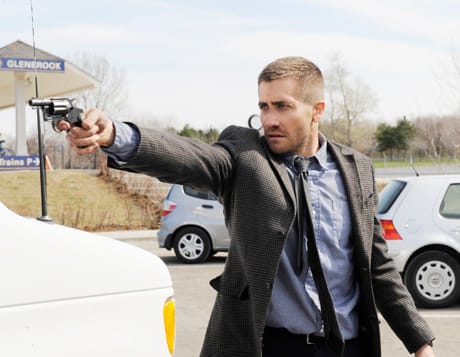"Notice?" It's the first word spoken by a man awakening on a train. A response and question to the woman sitting across from him, it's also a call to action for the audience, and the man.
With Aronofsky-style rhythmic editing, a series of events unfold: coffee is spilled, the woman mentions gurus, a man makes a comment on a phone and someone drops a stack of papers. The woman (Michelle Monaghan, Gone Baby Gone) familiarly calls the man (Jake Gyllenhaal) Shawn. He doesn't know her and insists he's an army pilot named Colter Stevens. Sensibly confused, Colter goes to the bathroom, only to find a face that isn't his staring back at him in the mirror.
Shortly after, the train explodes, killing everyone on board. After a blur of images, Colter reawakens in a cold industrial pod. A woman in military garb speaks to him over a video link, introducing herself as Carol Goodwin (Vera Farminga, Up In the Air). The story begins to cohere as we learn that Colter is part of a program called "source code" and it's his mission to continually re-experience the eight-minute window prior to the train explosion until he can determine the identity of the bomber.
There is a hell of a lot more to Source Code, but as with Duncan Jones's first effort (near-masterpiece Moon), at least half the fun is piecing together the mysterious plot threads that emerge as Colter experiences those eight minutes with increasing insight.
Source Code brings to mind elements of 12 Monkeys, Jacob's Ladder and that episode of The X-Files where Scully and Mulder are stuck in a time loop trying to prevent a bank explosion. This film, however, isn't as interested in confounding as it is in clearly, but methodically, leading viewers through heady sci-fi concepts.
A personal reconciliation sub-plot is less well developed, but still emotionally effective. Some shots are absolutely beautiful, especially the variations on the explosion and a frozen moment late in the film that'll bring a smile to the face of all but the most emotionally jaded viewers. Russell Peters appears as a version of himself, contributing refreshing levity amid deadly seriousness. The welcome presence of Jeffrey Wright (Syriana) rounds out the dependable cast.
Jones found a strong alternative to the magical touch of composer Clint Mansel. Chris Bacon delivers a score that sounds a bit like Danny Elfman after a Bernard Herrmann (Hitchcock's early go-to guy) binge. It's not as emotionally rich or memorable as Mansel's Moon score, nor is the movie itself, but it creates an appropriate sense of mysterious tension.
Source Code is an uncommonly clever and well-executed sci-fi thriller, ample proof that Duncan Jones is a burgeoning talent to take notice of.
(eOne)With Aronofsky-style rhythmic editing, a series of events unfold: coffee is spilled, the woman mentions gurus, a man makes a comment on a phone and someone drops a stack of papers. The woman (Michelle Monaghan, Gone Baby Gone) familiarly calls the man (Jake Gyllenhaal) Shawn. He doesn't know her and insists he's an army pilot named Colter Stevens. Sensibly confused, Colter goes to the bathroom, only to find a face that isn't his staring back at him in the mirror.
Shortly after, the train explodes, killing everyone on board. After a blur of images, Colter reawakens in a cold industrial pod. A woman in military garb speaks to him over a video link, introducing herself as Carol Goodwin (Vera Farminga, Up In the Air). The story begins to cohere as we learn that Colter is part of a program called "source code" and it's his mission to continually re-experience the eight-minute window prior to the train explosion until he can determine the identity of the bomber.
There is a hell of a lot more to Source Code, but as with Duncan Jones's first effort (near-masterpiece Moon), at least half the fun is piecing together the mysterious plot threads that emerge as Colter experiences those eight minutes with increasing insight.
Source Code brings to mind elements of 12 Monkeys, Jacob's Ladder and that episode of The X-Files where Scully and Mulder are stuck in a time loop trying to prevent a bank explosion. This film, however, isn't as interested in confounding as it is in clearly, but methodically, leading viewers through heady sci-fi concepts.
A personal reconciliation sub-plot is less well developed, but still emotionally effective. Some shots are absolutely beautiful, especially the variations on the explosion and a frozen moment late in the film that'll bring a smile to the face of all but the most emotionally jaded viewers. Russell Peters appears as a version of himself, contributing refreshing levity amid deadly seriousness. The welcome presence of Jeffrey Wright (Syriana) rounds out the dependable cast.
Jones found a strong alternative to the magical touch of composer Clint Mansel. Chris Bacon delivers a score that sounds a bit like Danny Elfman after a Bernard Herrmann (Hitchcock's early go-to guy) binge. It's not as emotionally rich or memorable as Mansel's Moon score, nor is the movie itself, but it creates an appropriate sense of mysterious tension.
Source Code is an uncommonly clever and well-executed sci-fi thriller, ample proof that Duncan Jones is a burgeoning talent to take notice of.
